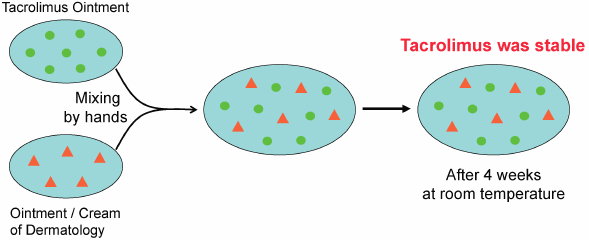Tacrolimus is often prescribed for T cell-mediated diseases such as:
1. eczema or atopic dermatitis
2. psoriasis
3. Vitiligo
Orally Tacrolimus is used to:
1. prevent organ rejection
2. Uveitis after Bone Marrow transplantation
3. Minimal change disease of the kidney
4. Kimura’s disease
Tacrolimus inhibits the production of interleukin-2, a molecule that promotes the development and proliferation of T cells, which are vital to the body’s adaptive immune response (ie, its learned immune response).
It is a 23-membered macrolide lactone that was first discovered in 1987 from the fermentation broth of a Japanese soil sample that contained the bacterium Streptomyces tsukubaensis.
Tacrolimus can cause an allergic contact dermatitis. I have seen about 10 cases but just saw one possibly so I wanted to write about this potential side effect.
Most patients tolerate it very well, though.
SLC
References:
J Am Acad Dermatol. 2004 Jun;50(6):962-5.
Allergic contact dermatitis from tacrolimus.
Author information
- 1
- Department of Medicine, University of California, San Diego, California 92103-8420, USA. dwshaw@ucsd.edu
Abstract
A 9-year-old boy developed allergic contact dermatitis from tacrolimus ointment. Tacrolimus was proven to be the allergen by right-versus-left double-blinded provocative use testing of tacrolimus ointment 0.1% versus inactive vehicle applied twice daily to normal preauricular and antecubital skin. Facial dermatitis appeared after 1 week and antecubital dermatitis after 7 weeks. Furthermore, patch testing of each individual ingredient was positive only with tacrolimus; a concentration of 2.5% in ethanol was required. Forty control patients had negative patch tests with tacrolimus 5% in ethanol. We hypothesize that the unusually long time required to elicit a positive use test on the arm and the high patch test concentration required on the back are caused by low percutaneous absorption through normal extrafacial skin. This is likely to be caused in part by the high molecular weight of tacrolimus. A similar phenomenon may occur when patch testing with neomycin sulfate.
References:
Abstract
Tacrolimus ointment is used worldwide to treat atopic dermatitis. Although tacrolimus ointment is not suitable for clinical admixtures, it is often mixed with various ointments or creams, such as corticosteroids, antibacterial agents, and moisturizing agents. There is only one report of quality testing of admixtures of tacrolimus ointment with adaparene gel (Differin® Gel). In this study, we used HPLC to evaluate the pharmaceutical stability of tacrolimus mixed with eight different dermatologic ointments or creams. No decrease in the tacrolimus content was observed in any of the mixtures after 4 weeks of storage at room temperature, indicating that tacrolimus admixtures are stable.
Graphical Abstract Fullsize Image
References (7)
- 1) Eto T. Usage of topical steroids-propriety of mixed prescription. Jpn. J. Clin. Dermat., 55, 96–101 (2001).
- 2) Japanese Dermatological Association. Guideline of care for the management of atopic dermatitis 2016. Jpn. J. Dermatol., 126, 121–155 (2016).
- 3) Interview Form of protopic ointment 0.1%, Maruho Co., Ltd., 2017.
- 4) Ohtani M. Effect of the admixture of commercially available corticosteroid ointments and/or creams on their efficacy and side effects. Jpn. J. Pharm. Health Care Sci., 29, 1–10 (2003), and references cited therein.
- 5) Ohtani M, Yamaoka Y, Matsumoto M, Namiki M, Yamamura Y, Etoh T. Compatibility of adaparene gel (Differin® Gel) with other kinds of ointments or creams. Yakuzaigaku, 69, 470–476 (2009).
- 6) https://en.wikipedia.org/wiki/Tacrolimus#targetText=Tacrolimus%2C%20also%20known%20as%20fujimycin,the%20risk%20of%20organ%20rejection.


